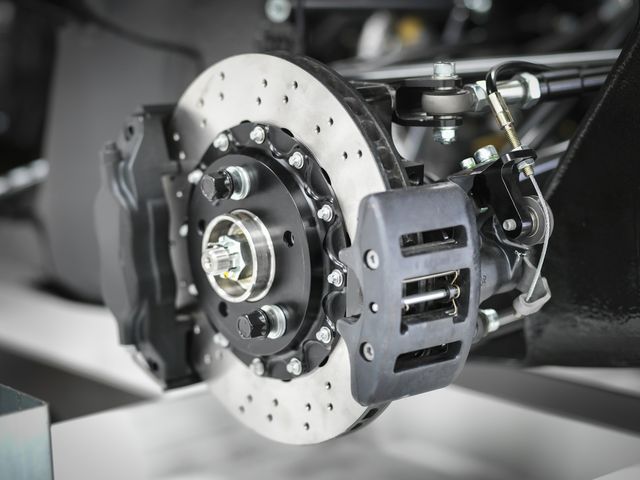What Is The Lifespan Of Brake Pads In A Car? | Brakes Hub
Brake pads are an essential part of the puzzle when it comes to the reliability of your car. Without a functioning braking system, it would be incredibly unsafe for you to drive on roads and highways. This is why knowing how long your brake pads will last is important.
The answer to “What is the lifespan of brake pads in a car” is not simple. The lifespan of brake pads can vary depending on several factors, including driving habits and road conditions. Most drivers’ brake pads should last between 30,000 to 70,000 miles before needing to be replaced; however, some vehicles may require replacements sooner than others, while other brakes can last significantly longer.
In general, though, a good rule of thumb is that you should change your brake pads every two years to stay safe and ensure optimal performance from your brakes. Let’s discuss this in detail below.
Why Do Brake Pads Wear Down?

When you press down on the brake pedal, special pads in your car’s brakes instantly clamp onto the brake rotors to slow down or stop the vehicle. This process, called friction, involves a great amount of pressure being created between the pad and rotor to bring the car to a halt. Over time, this friction causes the brake pads to wear away slowly, diminishing their performance.
The rate at which your brake pads wear away depends on several factors. The type of material used in your car’s braking system and your driving habits can impact how durable they are. Brake pads should be inspected regularly, and if they start to show signs of wear, they should be replaced right away so that you can ensure safe stopping power.
Remember that there will also be black dust covers over the wheels from the worn-out brake pads – keep an eye out for this sign so you know when it’s time for a new set.
What is the Lifespan of Brake Pads in A Car?
The lifespan of brake pads in a car will depend on many factors, such as the type of vehicle, driving habits, and road conditions. In general, most brake pads should last between 30,000 to 70,000 miles before needing to be replaced.
However, if you are an aggressive driver who brakes often and hard or drives in stop-and-go traffic frequently, your brake pads may need to be replaced sooner.
Which Thing Effects My Brake Pad?
Our life depends on the brake the second we sit in the car. That’s why taking care of brake pads is a must. Although there will come some point when you have to your brake pads eventually; however, there are some factors that influence brake pads which can reduce your brake pad, such as:
1. Driving Habits
When driving on the highway, it’s important to be mindful of your habits. If you’re going seventy miles per hour and you suddenly hit the brakes, your vehicle will need to expend a lot of energy to come to a stop. This sudden force can be hard on your brake pads – making them wear down quickly and leading to costly repairs in the future.
The best way to avoid damage caused by frequent braking is by driving at a steadier speed. Being aware of road conditions and anticipating stops will help you maintain a steadier pace without needing harsh braking.
Not only will you save money on replacing worn-out brake pads, but your trips will also be much smoother. Keeping an eye on how fast you’re going and how often you need to brake is an essential part of responsible driving.
2. Road Conditions
The condition of the roads you’re driving on can also affect your brake pads. Roads that are uneven or full of potholes require drivers to constantly use their brakes, which can cause the pads to wear down more quickly.
Not to mention, these types of surfaces can also cause other parts of the braking system to malfunction. To help protect your car, try to avoid driving on roads that are in poor condition where possible.
3. Type of Vehicle
The type of vehicle you drive can also be a factor in the lifespan of your brake pads. Larger vehicles, such as SUVs and pickup trucks, tend to require more energy to stop and therefore require stronger brakes.
This means that they need more durable pads that can withstand heavier braking. On the other hand, smaller cars tend to have lighter brakes and can use less durable pads.
These are just a few things that can influence the life of your brake pads. To get the most out of your car’s brakes, it’s important to keep an eye on them and replace them when necessary.
How To Extend the Lifespan of Your Brake Pads?

If you want to ensure that your car’s brake pads last as long as possible, taking some preventative measures can extend their lifespan. Here are some tips for making sure you get the most out of your brake pads:
1. Slower Driving
Slower driving is one of the best ways to prevent wear and tear on brake components. When driving slower, your brakes don’t need to exert so much force to halt the vehicle. This results in less pressure being placed on brake pads, reducing their wearing-out rate.
Slower speeds also allow for improved reaction time and better control behind the wheel, ensuring a safer and more comfortable ride for everyone involved.
It’s important to note that slower driving does not mean breaking the law or putting yourself in danger. You should always be aware of your surroundings and respect any posted signs or speed limits arranged for a given area.
If possible, keep speeds under 20mph while maneuvering through busy roads or highways. Not only will this help reduce overall wear and tear on your car, but it could also save someone else’s life.
2. Make Your Car Lighter
The weight of a vehicle is an often overlooked factor in car maintenance and performance. A heavier car requires more fuel to move, decreases acceleration, and may cause parts to wear out sooner. Reducing the weight of your car is one of the easiest ways to improve its performance.
One way to reduce the weight of your car is to check any cargo carriers, backseats, and trunks for any unnecessary items that add extra weight.
Removing anything you don’t need, like spare tools or heavy sports gear that aren’t regularly used, is important. Aside from reducing the wear on your brakes, lightening your load can also help reduce fuel costs and increase the life of your tires by decreasing rolling resistance.
So when it comes to improving the performance of your car and its components, reducing the weight should be at the top of your list.
3. Regular Check-Ups
Regular check-ups are important for any car, as they can help you spot potential issues before they become major problems. It’s especially important when it comes to brake pads; if you notice any irregularities, such as an inconsistent braking performance or squeaking sounds coming from your brakes, then it’s time for a quick inspection.
By having a licensed mechanic look at your car, you’ll be able to get an early diagnosis of any potential brake pad issues.
Regular check-ups can also help you catch any potential problems with other vehicle parts, such as the drivetrain, suspension, and steering systems. A problem in any of these areas could cause extra strain on your brakes, resulting in faster wear and tear.
Frequently Asked Questions [FAQs]
1. When Should Brake Pads Be Replaced?
Brake pads should be replaced when worn down to about 1/4 inch or less. This is because the material in the brake pads helps to reduce noise and vibrations, and if it’s too thin, it won’t be able to do its job correctly.
As far as lifespan goes, this can vary greatly based on several factors, including type of vehicle, driving habits, and road conditions. Generally speaking, the average lifespan of brake pads is around 25,000 to 50,000 miles.
2. How Do I Know If My Brake Pads Are OK?
To check your brake pads, examine the area between the wheel’s spokes to see the outer pad against the brake disc. It should be inspected if the pad is less than 3mm visible. Certain brake pads have a wear indicator slot in the middle.
3. How Do I Know If My Brake Pads Are Good Or Bad?
Inspecting brake pads for wear and tear can be done in some cases. If the vehicle model permits, the outer pad may be visible through the wheel spokes, where it will contact the brake disc. A minimum of 3mm of the pad should be noticeable.
4. What Damages Brake Pads?
Brake pads are an essential part of a car’s braking system, and they require regular maintenance to ensure they stay in good working condition. Faulty or worn brake pads can cause damage to other parts of the braking system, such as the rotors and calipers, resulting in costly repairs.
The lifespan of brake pads can vary depending on the type of material used, driving habits, and road conditions. Generally, the average lifespan of brake pads is around 25,000 to 50,000 miles.
5. What Do Bad Brake Pads Sound Like?
Brake pads contain a metal wear indicator that produces a noise when they are worn out, signaling the need for replacement.
Conclusion
Finding out what is the lifespan of brake pads in a car is important in order to maintain the safety and reliability of your vehicle. Most brake pads should last between 25,000 to 70,000 miles before they need to be replaced; however, this can vary depending on several factors, such as your driving habits and the type of vehicle. Remember to inspect your brakes regularly and adopt good driving habits to extend your brake pads’ life.
